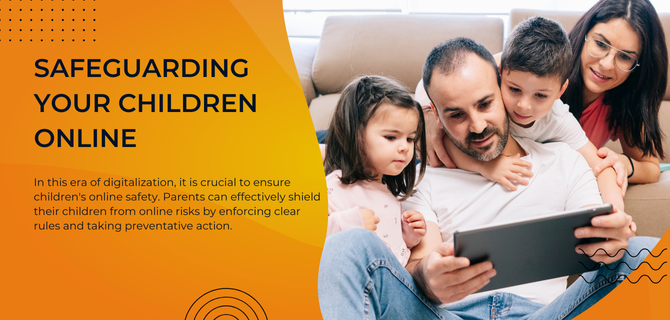
Introduction
In this era of digitalization, it is crucial to ensure children's online safety. Parents can effectively shield their children from online risks by enforcing clear rules and taking preventative action.
Internet Safety Rules for Children
1. Protect Personal Information: Never share personal details with anyone like home address or phone number online.
2. Seek Adult Help: Immediately report any messages or websites that feel uncomfortable or unsafe with the help of your parent or guardian.
3. Social Networking Caution: Avoid befriending strangers on social media platforms.
4. Permission for Meetings: Always get prior permission before meeting someone in person whom you met online.
5. Permission for Posting: Seek approval before sharing personal information or photos online.
6. Software Downloads: Always ask for permission before downloading or installing any software.
7. Password Protection: Do not share passwords with anyone except parents and remember to log out from public computers.
8. Online Purchases: Obtain permission before making any purchases online.
9. Respectful Communication: Refrain from sending or responding to rude messages.
10. Location Privacy: Never disclose specific whereabouts or future plans online.
Action Steps for Adults
1. Monitor Computer Usage: Place computers in visible areas to supervise children’s online activities.
2. Educate Yourself: Stay informed and updated about internet and computer usage to understand potential risks.
3. Set Time Limits: Establish and enforce screen time limits for young children.
4. Open Communication: Keep having regular conversations with children about internet safety to build awareness and trust.
5. Address Cyberbullying: Ensure your children feel comfortable reporting any incidents of cyberbullying or discomfort they experienced online to you.
6. Parental Controls: Utilize and customize parental control settings on all accessible devices.
7. Social Media Monitoring: Stay connected with your children on social media platforms by adding them as friends or contacts.
8. Monitor Online Activity: Use parental control apps or monitoring tools to oversee online behavior if it is appropriate or not.
9. Watch Emotional Signs: Be vigilant for signs of emotional distress that could indicate cyberbullying.
10. Maintain Security: Install antivirus software and keep all devices and software up to date to protect against online threats.
Conclusion
Families can establish a safer online environment by combining proactive adult behavior with clear internet safety guidelines for their children. To make sure that kids use the internet sensibly and safely, regular communication and supervision are essential.